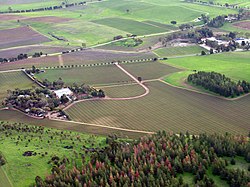Barossa Valley wine region
| Wine region | |

Aerial view of the Barossa Valley
|
|
| Type | Geographical indication (GI) |
|---|---|
| Year established | 1997 |
| Years of wine industry | Since 1843 |
| Country | Australia |
| Part of | Barossa Zone |
| Growing season | October-April |
| Climate region | Mediterranean |
| Heat units | 1710 |
| Soil conditions | Clay loam through to sandy |
| Size of planted vineyards | 10,350 hectares (25,600 acres) |
| Varietals produced | |
| No. of wineries | 37 |
| Comments | Data from 2012 |
The Barossa Valley wine region is one of Australia's oldest wine regions. Located in South Australia, the Barossa Valley is about 56 km (35 miles) northeast of the city of Adelaide. Unlike most of Australia whose wine industry was heavily influenced by the British, the wine industry of the Barossa Valley was founded by German settlers fleeing persecution from the Prussian province of Silesia (in what is now Poland). The hot continental climate of the region promoted the production of very ripe grapes that was the linchpin of the early Australian fortified wine industry. As the modern Australian wine industry shifted towards red table wines (particularly those made by the prestigious Cabernet Sauvignon) in the mid-20th century, the Barossa Valley fell out of favor due to its reputation for being largely a Syrah from producers whose grapes were destined for blending. During this period the name "Barossa Valley" rarely appeared on wine labels. In the 1980s, the emergence of several boutique families specializing in old vine Shiraz wines began to capture international attention for the distinctive style of Barossa Shiraz, a full bodied red wine with rich chocolate and spice notes. This led to a renaissance in the Barossa Valley which catapulted the region to the forefront of the Australian wine industry.
...
Wikipedia
